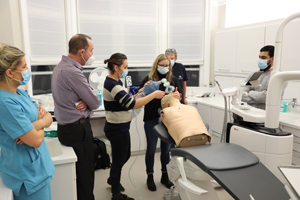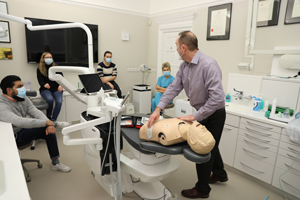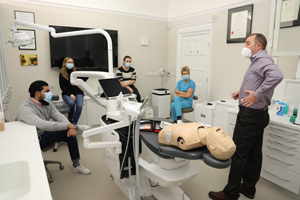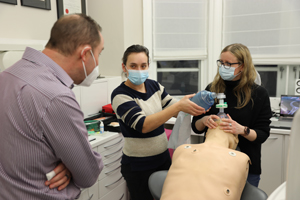Anyone who has completed our Medical History Questionnaire knows that we take the medical well-being of our patients at LCIAD very seriously.
Medical emergencies in dental practice are thankfully rare. Some practitioners may go their whole lives without seeing one. However, this is precisely why it is important to train regularly and meaningfully to ensure that the whole team is up to date with our emergency procedures and knows their equipment, drugs and protocols. This is not just a tick box exercise. We train with an experienced Medical Emergencies trainer to deal efficiently and correctly with real emergency situations that may emerge in dental practice. The LCIAD team last trained for medical emergencies in dental practice in the summer of 2020 after re-opening following lockdown. This time, it was for advanced immediate life support for scenarios involving dental sedation where our patient is under the influence of sedative drugs.
Our management of medical emergencies is regularly updated to a high standard with hands-on, realistic scenarios devised by our experienced trainer Pete Chell of Quest Dental Training and Development. Pete is member of the European Resuscitation Council, the Advanced Life Support (ALS) and Generic Instructor Course (GIC) faculty. He is a Fellow of the Institute of Training and Occupational Learning (ITOL).
The training involves the use of data from real scenarios to test our rapid diagnostic and life support skills. We train with patient assessment checklists and revise and practice Airway maintenance, Breathing support, Circulatory support, assessment of Disability and when to Expose the patient to assess for systemic problems to allow access for medical life support whilst maintaining dignity. (The Resuscitation Council UK’s ABCDE approach.)
Training included an update on appropriate use of emergency drugs, oximeter, blood sugar monitor, blood pressure monitoring, automatic defibrillator and use of CPR. Conditions such as fainting, angina, cardiac arrest, acute asthma, anaphylaxis, choking and airway obstruction, hypoglycaemia, epileptic fits, over-sedation and unexpected bleeding were all covered. The team tested its response time to diagnosis and its efficiency in providing emergency life support in scenarios that may occur in practice at any time.
We are most grateful to Pete Chell for his training methods and testing our knowledge, combining seriousness with fun and in making this course memorable and thought-provoking. We all look forward to welcoming him back in the summer for our annual medical emergencies training update.





